Become a Creator today!Start creating today - Share your story with the world!
Start for free
00:00:00
00:00:01

Kevin Flynn: From courtroom to the page
Sarah and Brook speak with former Department of Justice prosecutor Kevin Flynn about moving from a legal career to writing mystery fiction and non-fiction.
Mentioned
Relentless Pursuit (2007) Kevin Flynn
Rock Creek (2024) Kevin Flynn
For more information
Instagram: @cluedinmystery
Contact us: [email protected]
Music: Signs To Nowhere by Shane Ivers – www.silvermansound.com
Sign up for our newsletter: https://cluedinmystery.com/clued-in-chronicle/
Join the Clued in Cartel: https://cluedinmystery.com/clued-in-cartel/
About Kevin
website: https://www.kevinflynnauthor.com/
Visit our website for the full transcript.
Transcript
Introduction of Hosts
00:00:12
Speaker
Welcome to Clued in Mystery. I'm Sarah. And I'm Brooke, and we both love mystery.
Season Seven's First Interview
00:00:19
Speaker
Hi Brooke. Hi Sarah, today we're going to have our first interview of season seven.
00:00:26
Speaker
I'm very excited. I am too. Let me introduce our special guest.
Kevin Flynn's Journey to Writing
00:00:32
Speaker
Born in Washington DC, Kevin Flynn grew up in the suburb of Annandale, Virginia, but spent part of every weekend in the city as his grandparents lived in DC's Southeast Quadrant.
00:00:43
Speaker
Kevin graduated from the University of Notre Dame and the University of Virginia School of Law, then worked for five years in private practice. Later, as a DC prosecutor, Kevin tried almost 30 murder cases, investigated hundreds more, and was instrumental in dismantling criminal street gangs.
00:01:03
Speaker
His work brought him into daily contact with the best and worst aspects of human nature, and those experiences have provided him with the sensibility and perspective that is infused in his fiction and nonfiction writing. Kevin lives in Northern Virginia with his wife Patrice, also a career attorney for the U.S. Department of Justice. Their children, Connor and Megan, continue the family's legacy of public service in New York City.
00:01:30
Speaker
We're really looking forward to speaking with someone who's actually worked on criminal cases and now writes fictional ones. So welcome to Clueden Mystery, Kevin. Well, thank you very much. I'm really thrilled to be here and to be able to talk about this subject with you all. It's close to my heart as I was close to yours.
Challenges of Career Transition
00:01:50
Speaker
Wonderful. So, Kevin, what challenges do lawyers face when transitioning from the courtroom to writing about fictional cases?
00:02:00
Speaker
My situation is a little bit unusual in the sense that I did it while I was actually still prosecuting. I wrote a book in 2007 called Relentless Pursuit and it was about a murder case that I had tried and how my family and the victim's family intertwined and the spine of the book was that the investigation and the trial of the case.
00:02:23
Speaker
After that book came out in 2007, I went on a sabbatical, a family sabbatical, and I had some time on my hands. It was basically, I would take care, I would do all the stuff that my wife would do when she was part-time with the kids in the morning and the kids in the afternoon. And she went full-time, so we sort of switched roles. And in the middle of the day, I had a yawning gap, and so I wasn't working.
Writing 'Rock Creek' and Creative Process
00:02:47
Speaker
And so I started writing and I had time to sit down and write fiction and then it took me about a year to write the manuscript for the book that has come out this past week called Rock Creek, which is a work of fiction set in DC in the 1950s. The first draft wasn't ready to pass muster. My agent wasn't able to put it out just yet and I understand why now when I look back at it.
00:03:12
Speaker
In the years to come, I proceeded to do multiple edits on it. At the same time, I was working as a violent crime prosecutor. I had gone back to my job and was working a full-time job. My wife and I were raising our kids through adolescence and off to college and all that. I only left the Department of Justice last year in anticipation of this book coming out. My situation was a little bit different.
00:03:38
Speaker
just in terms of the time devotion and the practical logistical aspect of it. In terms of just the artistic challenge, I guess I would say that it's
00:03:50
Speaker
We as lawyers, as prosecutors, work in a very linear way and we're sort of like, we're forward looking, we're given a case and we're moving forward with it. And when you're writing fiction, you're creating your own world. The world of being a prosecutor is very much fact-based and it's reality-based in its greatest form. And you deal with the facts that are given you. When you're writing fiction, you're creating a whole different world and you're creating
00:04:18
Speaker
you're creating your own characters, you're creating your own place, you're creating your own narrative and your own structure, and the structure isn't provided
Balancing Family and Fictional Writing
00:04:26
Speaker
to you by real life. So that is both, it's both a challenge, but it's extraordinarily liberating, too, as a writer.
00:04:34
Speaker
Yeah, definitely. I love the way that you described balancing your family life with your work life and your career because I think that that's just kind of a universal thing for a lot of authors. We imagine that you get to do it full time and just devote yourself to your craft, but most of us are juggling many different things and it sounds like that was your experience as well.
00:04:57
Speaker
It was, and I have to say, I was very committed when I wrote Rock Creek and I was developing the characters not to have the characters at all based on people who are close to me. So in other words, the protagonist whose name is Shane Kinnick, he's a homicide detective.
00:05:13
Speaker
And he's based on and inspired by various detectives and prosecutors that I have known over the years in terms of just how he goes about his job. But I didn't want him to have a wife. He's somewhat bereft on the domestic front. I didn't want there to be any intrusion of my personal life.
00:05:33
Speaker
I didn't want my wife to see herself, oh my God, I'm the character in your book. I had a wonderful relationship with my father. Shane Kinneke has a very strained relationship with his father. I have a wonderful relationship with my son. None of those relationships entered into this. And so on the family side of things, that was a great counterbalance with my work and also with my writing.
Storytelling Influenced by Legal Career
00:05:55
Speaker
From the point of view of my job, being able to still work at that job full time,
00:06:00
Speaker
and have that amplify my editing, which I was in the process of doing after I returned to DOJ. That was extraordinarily beneficial. I've said, and I'll say it, this is the running theme throughout any time that I talk about writing, particularly about Rock Creek.
00:06:19
Speaker
is that I would not be a good fiction writer at all if it weren't for having been a prosecutor and a trial lawyer. Everything about my approach to creating characters, to setting place, to setting narrative, to even the minutiae of writing is inspired by and to some extent formed by
00:06:40
Speaker
by having to sit down and strategize for trial, work with people, develop storylines, and then see those processes through to completion. Trial lawyering is storytelling, it's pure and simple, and I would not be able to tell stories if I had not had to tell them in court, of course, within an authentic and true and real-life scenario.
Learning from Feedback and Revisions
00:07:05
Speaker
Oh, that's fascinating. I love that that you said that, you know, it is storytelling. We imagine what it's like to be an author or to write a book. Was there anything that surprised you about the process of writing fiction?
00:07:18
Speaker
It is really, really, really hard. My first book, I tried the case in 1994. I started writing it in 1995. I finished that draft in 1997, but I had some family illness that intervened. My mother got very sick, fortunately recovered.
00:07:36
Speaker
But so that book started going out in 1997 and it didn't get finally published until 2007. So I was familiar when I sat down to write Rock Creek. I was familiar with the process of the editing, the revising, the putting it back out to multiple different publishers, etc. But I didn't really, I didn't realize
00:07:59
Speaker
How much fiction is different than nonfiction until I really actually have sat down through the editing process. I thought my first draft was great and then it didn't meet with quite the same reception from my agent or from actually people who are even close to me who.
00:08:15
Speaker
who read it. It's just certain technical parts of the process I had to master over the course of the edit. Just to give you a brief example, it's just going to be, it's sort of like a technical intermixture between trial lawyer and writing.
00:08:32
Speaker
I knew when I was in court and I had a witness on the stand that I always wanted to end their testimony. If it was a witness for me, particularly an important witness, I wanted to end their testimony on a high note. I wanted the last question and answer to be something that was impactful. But that's of course called direct examination.
00:08:51
Speaker
but you don't start a direct examination with a killer question right out of the box you're introducing the jury or the judge to the witness so there are introductory questions and there is a certain sense of setting the background and setting all that up and i realized only very late in the editing process how much that had
00:09:10
Speaker
help me as a writer i could end chapters very compelling but my instinct just in my head was always to start the next chapter with background information or with. Exposition or with description.
00:09:25
Speaker
Somebody once described reading one of my early drafts as every time I read a chapter I like it and then I have to start all over again instead of immediately cutting to something that is going to be compelling to make the reader go through and go on. So it took me a long time. There was a lot of stuff from my trial lawyering experience that I could apply to fiction.
00:09:45
Speaker
certain things I had to break myself of the habit of as I was constructing chapters and going through the actual writing process. And that was something that just had to work its way through. I love a quote that I read relatively recently, but it resonated with me that good writing is in the writing and great writing is in the revising. And so that was a real part of the process.
00:10:14
Speaker
So you mentioned how your approach to writing was inspired by your experience as a prosecutor and your character in Rock Creek was informed by people that you've worked with in the past. Did a real life case inspire the rest of the story?
Inspiration Behind 'Rock Creek'
00:10:31
Speaker
It did, very much so. The origin of Rock Creek is found in basically a 15-minute discussion that I had with a friend, actually the agent for my first book, Relentless Pursuit. I was in the middle of my, or just actually starting out my sabbatical, and he said, well, what's your next book going to be about?
00:10:53
Speaker
Inside my head i thought to myself well i just finished this one why do you want to make me go through the process again but he said have you worked on any high profile cases that might be the subject for the second non-fiction book and i said yeah i worked on
00:11:10
Speaker
the Chandra Levy case, and I don't know if you all are familiar with that. It's the case that is about a Washington intern who had been found dead in Rock Creek Park. First, she went missing. A year later, she was found dead. While she was missing, but presumed having been the victim of foul play, it came out that she had been in an affair with a California congressman working in Congress in D.C.
00:11:35
Speaker
He became a suspect. It became a national story. He was later exonerated appropriately. I had worked on that case, but as I said to my agent and friend, I can't do anything with that. I can't because first it was still in the investigation stage, which meant that everything I had done on it was confidential.
00:11:57
Speaker
And second, I had gotten to know her parents well, and I didn't want to do anything that would seem to be exploitative of them and of that matter. And so we came up with the idea of fictionalizing the case and setting it back 50 years. So Rock Creek begins literally 50 years to the day, from the day that Shondra's body was found. So she was found in late May of 2002. The story begins in late May of 1952.
00:12:26
Speaker
And because of the fact that it was only the inspiration for the book, but the book was not based on it, I wanted to come up with a backstory for the victim that did not in any way parallel the real life story of Chandra Levy. That was a great challenge. And it was coming up with the story of someone, the victim in Rock Creek is very resilient. She is a survivor of horrible experiences.
00:12:51
Speaker
She manages to find her way to Washington, D.C., and she is very ambitious, and she's forward-looking, and she ends up being the victim of horrible crime. So that was my inspiration. The inspiration was the Levy case, but I want to make very clear that Rock Creek is not based on it. I don't want anybody to be under any misconceptions that I have used facts gleaned from that case to sort of mirror what is in my fiction.
Making Legal Topics Accessible
00:13:20
Speaker
Well, Kevin, law is a very complex and specialized topic. So how do you write about cases and the legal system in ways that can be accessible to all readers? Yes. And again, just my familiar refrain that that's the point of being a mantra is being a trial lawyer as opposed to, say, a transactional lawyer, a trusted estate's lawyer,
00:13:49
Speaker
having engaged in any of the other specialties. Because trial lawyering means that from the time you first set foot in a courtroom, you essentially have to take even the most complicated cases and make them comprehensible to the everyday average juror. The least successful trial lawyers that I have seen over the years
00:14:12
Speaker
were the ones who couldn't break things down for the average person who is sitting in the courtroom having to absorb facts about a case that by definition they know nothing about because if they know anything about it they're not to be able to sit on the jury so that's where storytelling comes in and that's where being able to.
00:14:32
Speaker
break big things down into smaller pieces. I think on the other end of the spectrum, some of the prosecutors that I've seen and the trial lawyers that I've seen that were the least successful were the lawyers that talked down to juries, who condescended to juries, who made it seem as if they were insulting juries intelligence, a jury's intelligence. So I knew when I started to sit down and write about legal matters, whether it
00:15:00
Speaker
relentless pursuit in non-fiction or in Rock Creek, which is about a murder case, I already had a sense for how to break a story down in a way that the average reader wouldn't feel overwhelmed by it. Rock Creek has several different subplots and there are different stories that are interwoven.
00:15:22
Speaker
And one of the challenges that I had, particularly in editing, was making sure that these stories, they overlap, they intertwine, but they did not interfere with each other. So, Kevin, can you tell us a little bit about when crafting a historical fiction narrative, how you balance factual accuracy with creative storytelling?
Research and Historical Accuracy
00:15:42
Speaker
That's a great question. I started with the research and then moved forward. So once I decided that I was going to take a story that was inspired by the Levy case and set it back in 1952 in DC, I had two things going for me. One was I grew up in
00:16:06
Speaker
in the Washington DC area and I was in DC every weekend of my life and I so I was born in 57 started being aware of being in and out of Washington DC when I was probably about five or six and had all the way through my life not only have been in and out of the city
00:16:23
Speaker
on a personal basis constantly but also obviously having worked professionally in DC working street crime. I know the city very well. I also knew something about the city in 1952 because, coincidentally, my parents met in DC
00:16:41
Speaker
in June of 1952, and I hope no psychoanalyst thinks that there are connotations there. I assure you that I did not consciously set out to write a book about the month in which my parents met, but it turned out that that was the case. Something actually occurred to me as I was in the planning process.
00:16:59
Speaker
So I knew from their stories and their pictures something about what the city was like then. But I still sat down to do a lot of research. And when I first sat down, and this was in 2007, I envisioned myself as going from library to library and having to look through microfiche and was really amazed and heartened to find out how much is available online. Even in 2007,
00:17:27
Speaker
all of the historical Washington Post were available online going back into the 1890s. And so I literally was able, as I was following through the narrative, to know day by day what was going on in the city at the time. I could put my hands on original source material that showed what fashions, what men's fashions, what women's fashions were like, what kind of cars were being driven, all the rest of that.
00:17:50
Speaker
And so I was very committed to just the historical fictional side being as accurate as possible. And I really think that given everything that's available to a writer, if you're writing historical fiction, it's almost sinful to get something wrong.
00:18:08
Speaker
Harry Truman was president in June of 1952. It wasn't Dwight Eisenhower. He was elected in November of 1952, was sworn in in 1953. If you have Eisenhower in office in a Washington, D.C. story in June of 1952, somebody who reads historical fiction is going to shut down because they're going to say the work didn't go in, Truman wasn't president.
00:18:31
Speaker
At the same time, you're not writing non-fiction, you're not writing history. So you are creating fictional characters and setting them into the time period of June of 1952. So, for example, Shane Kinnick's father is a very influential congressman.
00:18:48
Speaker
His name is Raymond Kinnick. He, as I said, has a strained relationship with Shane. He's very influential. He's very powerful. He didn't exist in 1952. He is trying to push through a civil rights bill in 1952. And in fact, there was not a major piece of civil rights legislation that was passed in Congress until more like the mid-50s, 1957, in fact.
00:19:12
Speaker
But once I decided to start putting fictional characters into my historical construct, by definition, you're interfering a little bit with history. But you have to do it in such a way that's still authentic. Is it outside the realm of possibility that a congressman
00:19:32
Speaker
would have seen civil rights as being an issue that he wanted to get out in front of and thought he had the power to do so. Yes, that's within the realm of possibility. The character who the victim has an affair with in Rock Creek is a congressman.
00:19:52
Speaker
very consciously modeled on a JFK type figure. And again, I had a certain amount of an advantage here because my mother had worked on capital health. And she had worked at one point for a Texas congressman who worked on the same corridor as JFK was as a young congressman. So I kind of knew something about the milieu. The character in Rock Creek is a JFK-like character. And his career is sort of following on a parallel path as JFK's in real life did.
00:20:22
Speaker
a different fate meets my character. You have to create fiction in a historical structure. And in doing so, you know that your fictional characters are influencing events back 67 years now, before, and then you start all over again. So the next time I write, I'm looking to take this into a sequel, but when I sit down five years later and I have these characters, they're starting all over again. And you're put in a 1957 historical context.
00:20:51
Speaker
but you're still creating fiction within that structure. But the structure itself has to be authentic. Yeah, that's great. In your opinion, what role can legal thrillers or dramas play in sparking conversations about current social and legal issues?
Legal Thrillers and Social Issues
00:21:09
Speaker
I think it can play a significant role. And I look particularly to historical fiction
00:21:18
Speaker
in the sense that it can introduce readers within the mystery and the thriller genre. It can introduce readers to the fact that, as the saying goes, history is a distant mirror.
00:21:34
Speaker
There are resonances in Rock Creek to social issues that we're going through to this day. When I sat down in 2007 and started writing and it was finally ready to be released to editors and
00:21:50
Speaker
Publishers and all the rest of that in the in the late in about 2015 or so during that time and through the editing process I realized that the ideas that I had come up with that would be resonant in 1952 remained resonant in 2013 15 20 22 now there is there a major sub theme in Rock Creek is race and
00:22:16
Speaker
One of the things which made Rock Creek Park, which is where, as I said, the real-life victim was found, a compelling place for me to write about was that in 1952, Rock Creek Park, which is a park that is basically in the middle of Washington, it's a beautiful park, it divides the city in halves more or less, but back then, divided
00:22:40
Speaker
the black part of town from the white part of town. And so crimes that were committed in the quote unquote white part of town were taken more seriously than crimes that were committed in the black part of town. And it was such a barrier, a geographical barrier in terms of race that blacks who strayed from the black part of town, which is west of Rock Creek Park to the white part of town were ticketed, even if all they were doing was walking down the street.
00:23:09
Speaker
There is a character in the book who ends up being charged with the murder of the victim in the case. His arrest sparks protests and a protest center around police misconduct in the course of the investigation of the murder, which leads to his apprehension and his arrest. And those protests, which actually didn't happen in 1952, could they have? Yes, but they didn't. But in my fictional construct, they did. And those mirrored
00:23:39
Speaker
in significant ways, things that happened particularly in 2020 and still continue to happen, social unrest having to do with race and issues having to do with police corruption. So just from the point of view of a historical piece that is a murder mystery,
00:24:00
Speaker
There is that way that this legal thriller, at least Rock Creek, can create dialogue about present-day issues. I think any piece of fiction, whether it's historical or not in whatever genre, but particularly since you asked about murder mystery, can illuminate current issues.
00:24:24
Speaker
The extent to which characters are created in a fictional work that embody real life characters who are going through real life issues. We, all of us, as we go about our day-to-day lives, all of us are affected by conditions outside of ourselves. And I think that the fiction that does not leap off the page to me is the type of fiction where the characters could be any place, any time,
00:24:48
Speaker
and could have any kind of background or no kind of background, and they just move about in their own world in a very sort of isolated. Gumshoe goes about trying to find a missing husband who is believed to have absconded with family funds and gone off on an affair with his secretary.
00:25:09
Speaker
But with no other context. You don't know where these people came from. You don't know where they're going. And you have none of the context that would make the story more interesting. And so a murder mystery or any kind of mystery, just like any kind of fiction, I think,
00:25:26
Speaker
is most resonant when it is in a place and surrounded by conditions which affect the characters and also the characters can affect. And so if you write like that, well then you are writing by definition a way that a reader will learn from in terms of the conditions that he or she is going through, he or she is experiencing, or he or she is aware of, both politically, socially, globally, whatever.
00:25:56
Speaker
So Kevin, it has been such a treat to speak to you today. Where can our listeners find you?
Where to Find 'Rock Creek'
00:26:03
Speaker
My author's website is at kevinflinnauthor.com. Rock Creek is available now on Amazon, Barnes and Noble, and on other retail sites. And I can also be reached by way of email through the contact portal on my kevinflinnauthor.com website. And I'm always happy to
00:26:26
Speaker
respond to readers' inquiries, and I really relish the exchange with people who wish to talk about the creative process, how Rock Creek came to be, and how they as writers might go through the sometimes torturous but ultimately rewarding process that I have.
00:26:47
Speaker
Thank you so much, Kevin. And thank you listeners for joining us today on A Clued in Mystery. I'm Brooke. And I'm Sarah. And we both love mystery.
00:26:58
Speaker
Clued In Mystery is written and produced by Brooke Peterson and Sarah M. Stephen. Music is by Shane Ivers. If you liked what you heard, please consider telling a friend, leaving a review, or subscribing with your favorite podcast listening app. Visit our website at cluedinmystery.com to sign up for our newsletter, The Clued In Chronicle, or to join our paid membership, The Clued In Cartel. We're on social media at Clued In Mystery.
![[Re-release] Mysteries in Unusual Formats image](https://media.zencastr.com/cdn-cgi/image/width=112,quality=85/image-files/61e1c276e3ec42007857cff9/d8f895fc-5446-494f-b2f8-5a3f6b131e98.jpg)




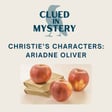



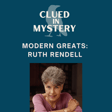
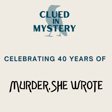
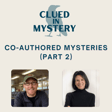





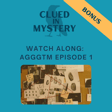
![[Re-release] Christie Adaptations with Teresa Peschel image](https://media.zencastr.com/cdn-cgi/image/width=112,quality=85/image-files/61e1c276e3ec42007857cff9/6f635402-1c64-4742-b267-b8bbebce8185.jpg)
